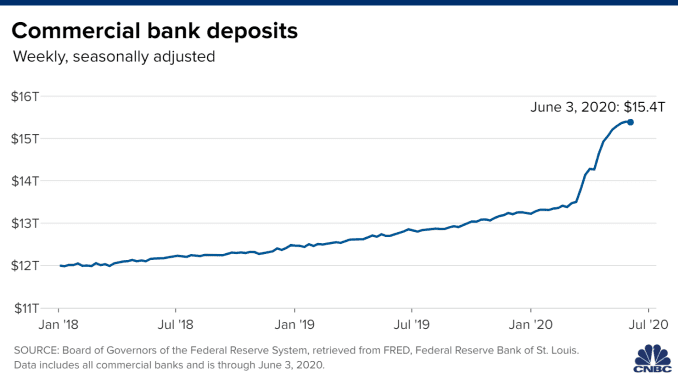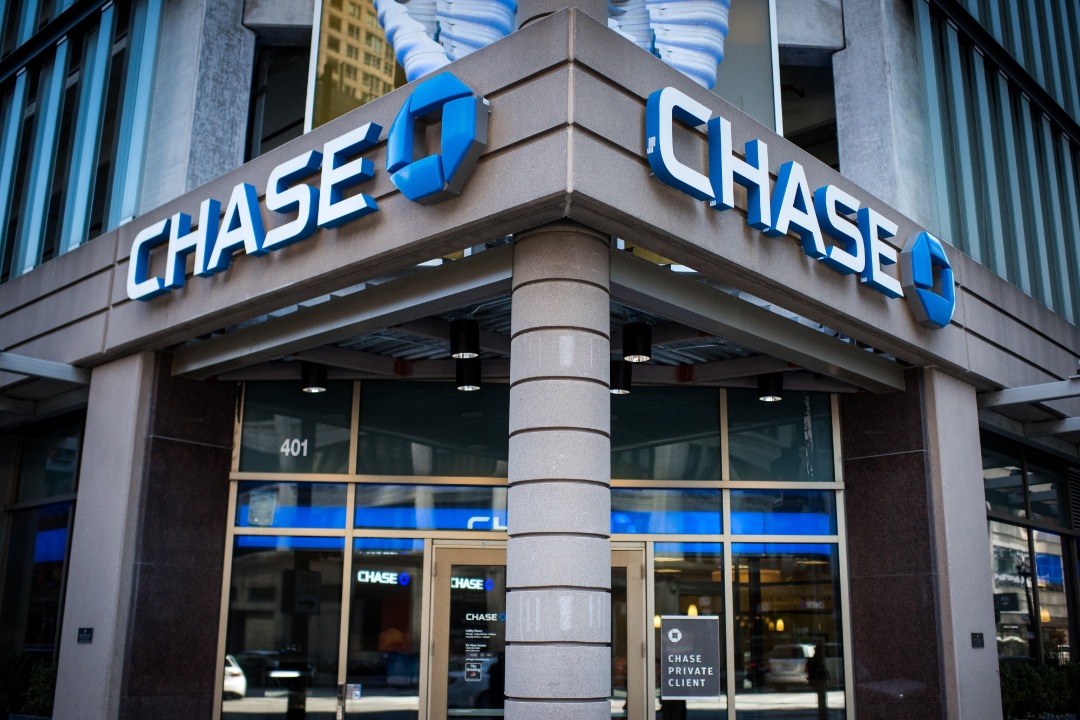- A record $2 trillion surge in cash has hit the deposit accounts of U.S. banks since the coronavirus first struck the U.S. in January, according to FDIC data.
- The wall of money flowing into banks has no precedent in history: in April alone, deposits grew by $865 billion, more than the previous record for an entire year.
- Deposit gains were concentrated at the very top of the industry: JPMorgan Chase, Bank of America and Citigroup grew much faster than smaller firms in the first quarter, according to company data.
- One consequence of the boom: Banks will likely lower their already paltry interest rates.
It’s the banking world’s version of the rich getting richer.
A record $2 trillion surge in cash hit the deposit accounts of U.S. banks since the coronavirus first struck the U.S. in January, according to FDIC data.
The wall of money flowing into banks has no precedent in history: in April alone, deposits grew by $865 billion, more than the previous record for an entire year.
The gains were all driven, in one way or another, by the response to the pandemic: The government unleashed hundreds of billions of dollars to bolster small businesses and individuals via stimulus checks and unemployment benefits. The Federal Reserve began a barrage of efforts to support financial markets, including an unlimited bond buying program. And an uncertain future prompted decision makers, from two-person households to global corporations, to horde cash.
More than two-thirds of the gains went to the 25 biggest institutions, according to the FDIC. And that was concentrated at the very top of the industry: JPMorgan Chase, Bank of America and Citigroup, the biggest U.S. banks by assets, grew much faster than the rest of the industry in the first quarter, according to company data.
“Any way you look at it, this growth has been absolutely extraordinary,” said Brian Foran, an analyst at Autonomous Research. “Banks are flooded with cash, they’re like Scrooge McDuck swimming in money.”

There are several reasons why the American megabanks — survivors of the last crisis in 2008 — were the main beneficiaries of the deposits bonanza. When states began instituting shutdowns in March, corporations including Boeing and Ford immediately drew tens of billions of dollars from lines of credit, and that money was initially parked at the banks making those loans.
Big banks also serviced a large chunk of customers in the Paycheck Protection Program, the government’s $660 billion effort to prop up small businesses. Since lenders mostly catered to existing customers, the money first landed in bank accounts of the firms that facilitated the loans.
Institutions known as trust banks, which are custodians for the investments of asset managers like BlackRock or Fidelity, gained deposits when the Fed bond buying program snapped up billions of dollars of mortgage backed securities. JPMorgan and Citigroup have large custody divisions.
And of course, the megabanks simply have the most U.S. retail customers; ordinary people with few options to spend money while sheltering at home. The personal savings rate hit a record 33% in April, the U.S. Bureau of Economic Analysis said last month. Personal income actually climbed 10.5% that month, thanks to $1,200 stimulus checks and unemployment benefits that totaled more than a worker’s regular income in some cases.
All that money flowed into bank accounts. Bank of America CEO Brian Moynihan told CNBC last month that checking accounts below $5,000 in balances actually had up to 40% more money in them than before the pandemic.

Megabanks, with their coast-to-coast networks of branches, have relied on plentiful deposits as a key advantage in the post-financial crisis era. They are one of the cheapest sources of funding for loans, helping the industry mint record profits even in a time of low interest rates.
But banks, which will be cautious lending money in the midst of a recession, are running out of uses for their growing mountain of cash, according to Foran.
“A lot of banks are saying, `There’s frankly not much we can do with it right now’,” he said. “They have more deposits than they know what to do with.”
If the deposit boom is merely one sign of the steps taken to blunt the financial harm from the pandemic, it remains to be seen what the ultimate consequences are for the government’s historic spending binge. Some experts see a collapse in the dollar coupled with higher inflation. Others see a stock market bubble in the making.
One consequence for savers will be more immediate, says Foran: Banks are sure to lower their already paltry interest rates, since they don’t need more of your money.
With contributions from CNBC’s Nate Rattner.




